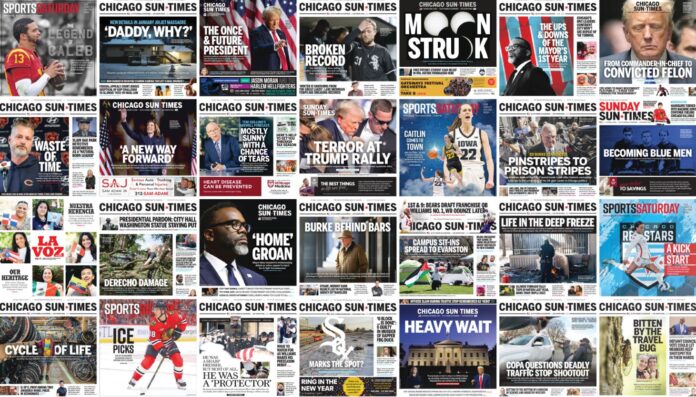It’s been another big year for Chicago area news. The Democratic National Convention came to town for the first time since 1996, and Chicago voters elected 10 school board members for the first time ever after the entire Chicago Public Schools board resigned. Voters also elected a new slate of U.S., state and county officials and approved nonbinding measures recommending the state create civil penalties for election interference, raise taxes for those with incomes over $1 million and expand pregnancy benefits to include in-vitro fertilization and other reproductive health treatments.
The homicide rate remained low in 2024, while the state’s domestic violence hotline remains deluged with calls after a 110% spike in domestic-violence deaths last year. It was Illinois’ first full year without cash bail and with an assault weapons ban, which continues to face legal challenges. Chicago-style politics received judgment in the courts, with former Ald. Ed Burke, former state Sen. Annazette Collins and Tim Mapes, former Illinois House Speaker Michael Madigan’s ex-chief of staff, sentenced to prison, while Madigan’s trial continues. And the continuing wars in Gaza and Ukraine left an indelible mark on the year, with Chicagoans taking action, mourning losses of life and coping with acts of hate.
In a tough year for Chicago sports, White Sox manager Pedro Grifol, Chicago Sky coach Teresa Witherspoon, Bears head coach Matt Eberflus and Blackhawks coach Luke Richardson were fired after disappointing results for their teams. In the natural world, the region saw the emergence of two broods of periodic cicadas for the first time in 200 years; a total solar eclipse, which will next be seen here in 2044; and multiple opportunities to see the northern lights.
In the Sun-Times newsroom, it’s been a year of experimentation and collaboration. Experiments to engage new audiences — which included tests of new approaches for stories, social media, liveblogs and our home page, as well as the launch of our text-messaging chat — grew loyal readers ages 18-24 by 45% and social audiences in that group by 22%, among other results.
We also grew our partnerships with other news outlets and deepened our community connections with public news meetings, ongoing community listening sessions, our second Chicago’s Next Voices contest to find new community guest columnists and the launch of a student version (submissions are due Dec. 31). Overall, we’re featuring more community members on our pages: The editorial board published hundreds of opinion stories and letters written by community members this year.
In response to what we heard from our communities, we launched our Money desk in January to protect consumers and taxpayers, help Chicagoans make the most of their money and better understand how business and financial decisions affect their families and communities. We also reenvisioned our Sunday edition based on community feedback.
Our distinctive coverage aims to hold public officials accountable, protect consumers and taxpayers, examine inequities, share information about efforts to improve our communities, grow understanding of Chicagoans’ diverse lived experiences — and celebrate the shared experiences, fandom and “only in Chicago” moments that bring us together.
Over the last year, Sun-Times reporting — which won more than a dozen top national awards — directly led to more than $1 million in past-due payments to the city and protected Chicagoan Robert Christie from City Hall citations related to damage from trucks that kept backing into his home. It resulted in the return of campaign contributions that were banned, that violated ethics rules or were from donors who won big contracts after making them. Our coverage was cited in a U.S. Supreme Court ruling in favor of a decorated Army veteran who was denied college money under the GI Bill; prompted a $10,000 donation from “Breaking Bad” star Bryan Cranston to the Bears Care charity; and resulted in a public rebuke of Kane County Sheriff Ron Hain for decisions that led to a fatal police shooting in Aurora.
The Illinois Supreme Court Commission on Professionalism, whose study estimated that 25% of Illinois lawyers had experienced bullying in the past year, reported being flooded with calls and messages about bullying — and ideas and initiatives to help change the culture of the profession — after we wrote about it. After our coverage of especially large tax breaks on 15 Cook County properties, including an erroneous one, the Assessor’s Office began demanding proof that homeowners qualify for the tax breaks — and is revisiting them.
These are just a few examples of the impact of our reporting this year. But local news can’t be taken for granted: The number of journalists in Illinois has fallen 86% since 2005, more than any other state in the nation. As Medill’s report on “The State of Local News” notes, communities with reliable sources of news experience higher voter participation in local and state elections, lower levels of government and business corruption, and lower prices and taxes than they see when those sources disappear.
We need your help to continue providing the well-reported stories that help our region thrive. If you appreciate what we’re doing, please consider supporting us with a donation or a subscription. You can also send us tips, submit an op-ed or letter to the editor or share this article with others to help spread the word about what we’re doing.
Thank you so much for your partnership and for keeping yourselves informed!
